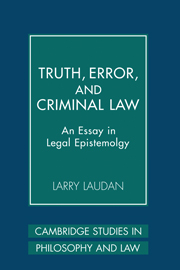Book contents
- Frontmatter
- Contents
- Preface
- Abbreviations and Acronyms Used
- 1 Thinking about Error in the Law
- PART I THE DISTRIBUTION OF ERROR
- PART II FLAWED RULES OF EVIDENCE AND PROCEDURE
- 5 Evaluating Evidence and Procedures
- 6 Silent Defendants, Silent Witnesses, and Lobotomized Jurors
- 7 Confessions, Poison Fruit, and Other Exclusions
- 8 Double Jeopardy and False Acquittals: Letting Felons and Judges off the Hook?
- 9 Dubious Motives for Flawed Rules: The Clash between Values
- Index
9 - Dubious Motives for Flawed Rules: The Clash between Values
Published online by Cambridge University Press: 05 June 2012
- Frontmatter
- Contents
- Preface
- Abbreviations and Acronyms Used
- 1 Thinking about Error in the Law
- PART I THE DISTRIBUTION OF ERROR
- PART II FLAWED RULES OF EVIDENCE AND PROCEDURE
- 5 Evaluating Evidence and Procedures
- 6 Silent Defendants, Silent Witnesses, and Lobotomized Jurors
- 7 Confessions, Poison Fruit, and Other Exclusions
- 8 Double Jeopardy and False Acquittals: Letting Felons and Judges off the Hook?
- 9 Dubious Motives for Flawed Rules: The Clash between Values
- Index
Summary
The central purpose of a criminal trial is to decide the factual question of the defendant's guilt or innocence.
– U.S. Supreme Court (1986)Rights always trump reliability.
– William PizziThe manifest destiny of evidence law is a progressive lowering of the barriers to truth.
– C. McCormickIn the previous four chapters, we have seen repeatedly how truth-thwarting rules or procedures have been put in place across a wide spectrum of rules of evidence and procedures. In several cases, I have suggested alternatives to those rules that would be more conducive to finding out the truth about a crime. Now, at the end of this long thought experiment, we have to choose between these genuinely truth-promoting rules and their truth-thwarting counterparts. If epistemic values were the only ones in play, the choice would be a foregone conclusion. But other values – from those focused on the rights of participants in a criminal proceeding to questions of public image and efficiency – do intrude, meaning that difficult choices must be made.
If we are to decide between existing rules and some of my proposed alternatives, we have to face squarely the question of how, if at all, conflicts between these different sorts of values can be resolved. It will probably be helpful if, from the outset, we recognize that the sorts of reasons given for the various truth-thwarting rules I have been scrutinizing fall more or less cleanly into five distinct classes:
Distributionist concerns, seeking to lower still further the likelihood of a false conviction
[…]
- Type
- Chapter
- Information
- Truth, Error, and Criminal LawAn Essay in Legal Epistemology, pp. 213 - 234Publisher: Cambridge University PressPrint publication year: 2006



